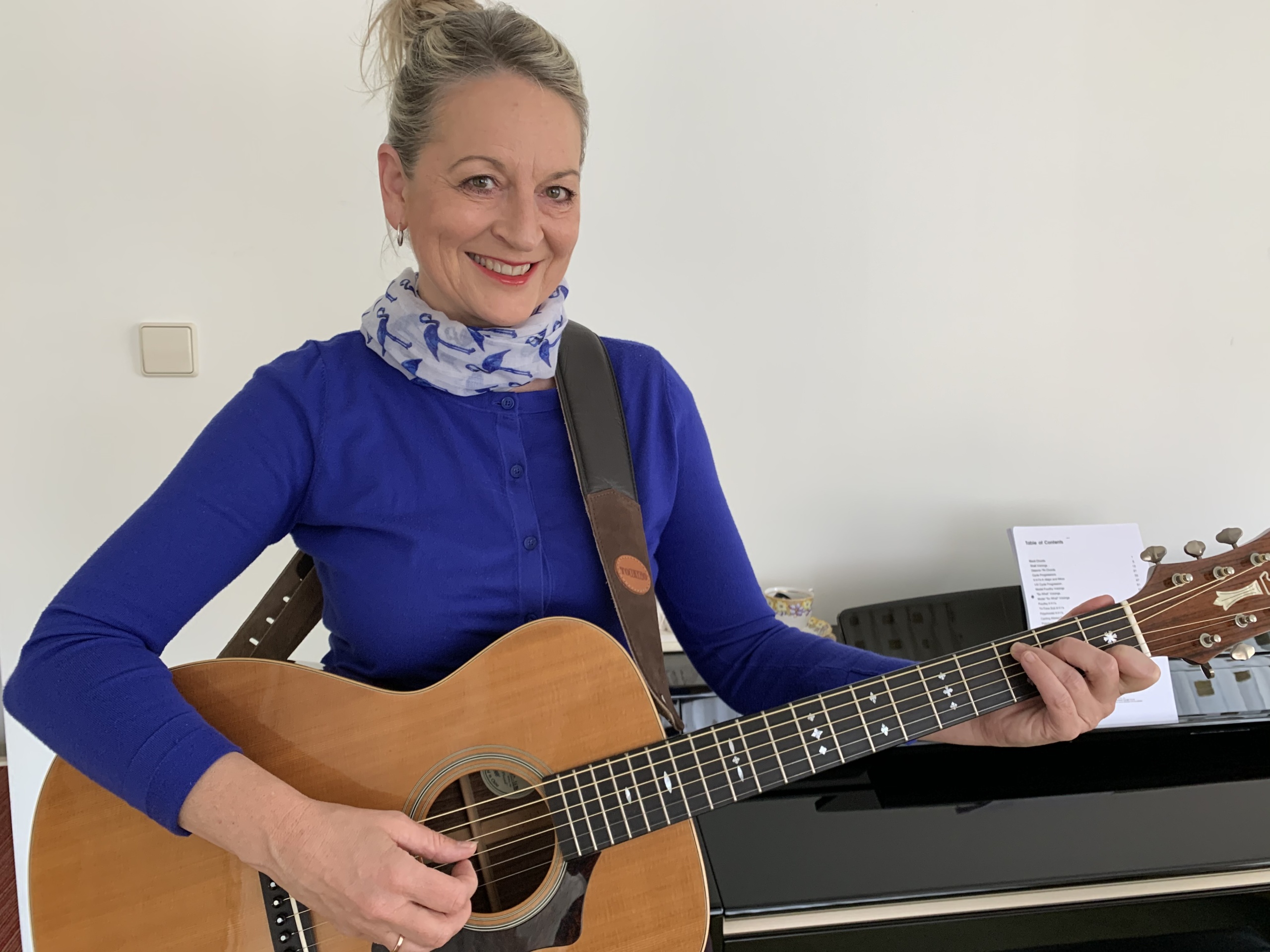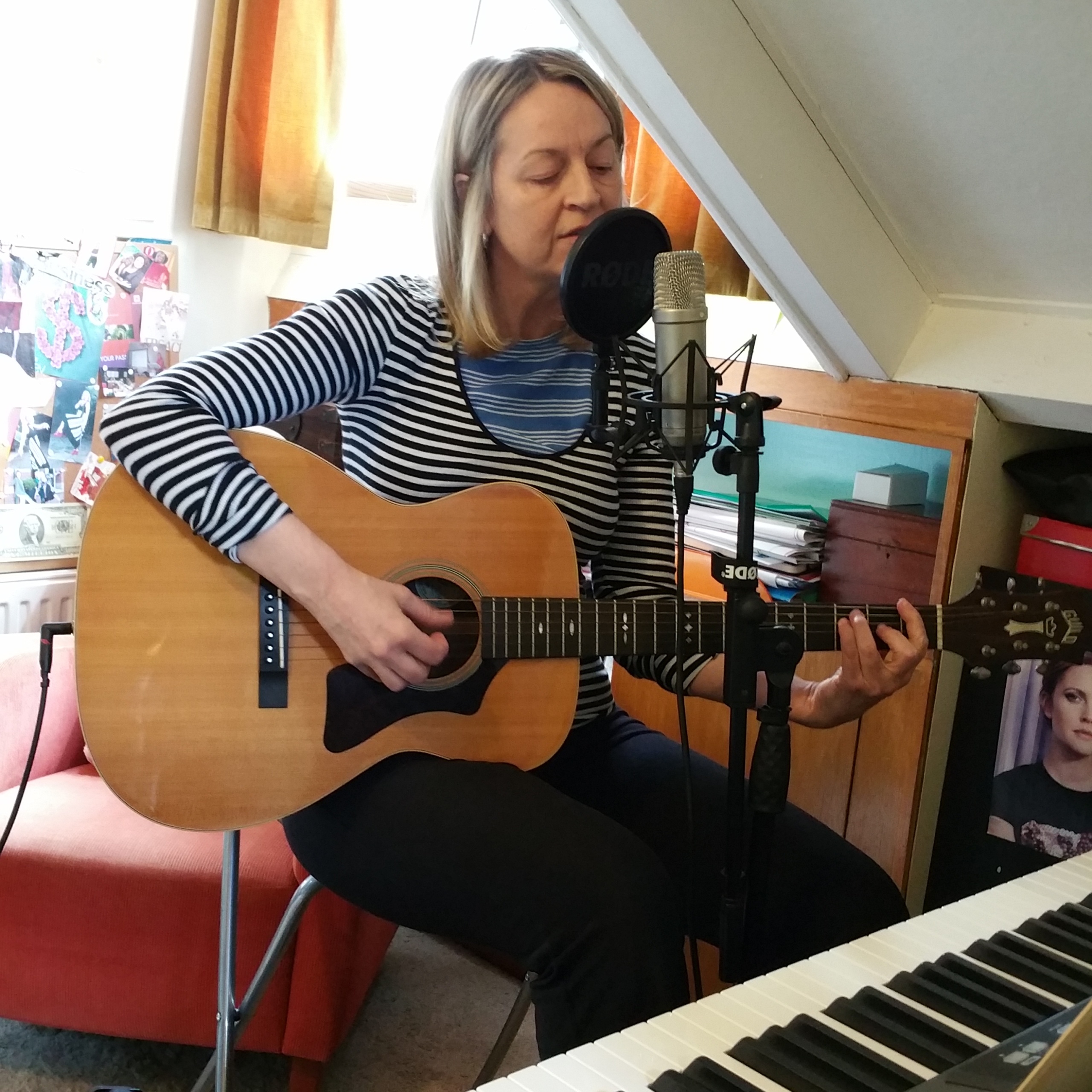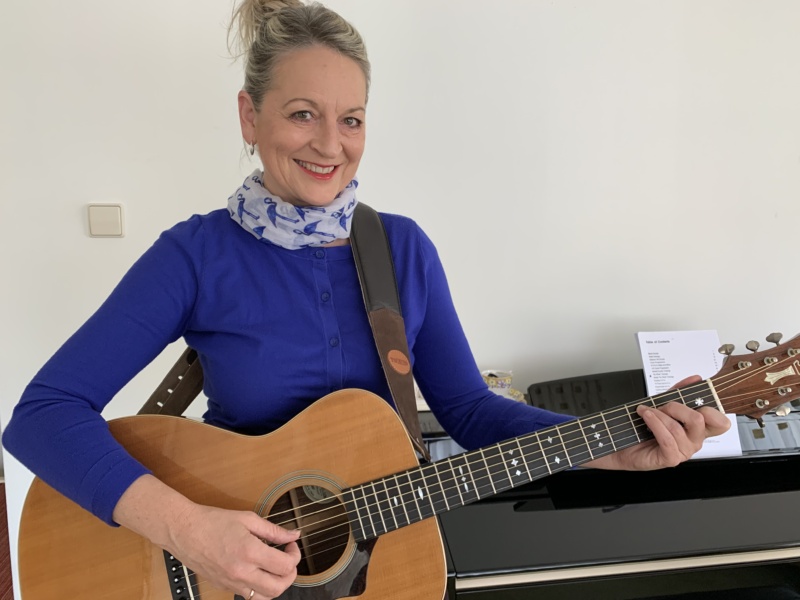- Name
- Jacinta Noonan
- Expertise/Specialty
- Jacinta is a professional coach and facilitator, living in The Netherlands. She is a natural teacher and has taught at numerous universities, corporates and schools in Europe and Asia Pacific. One of her coaching specialities is adult ADHD, a very misunderstood condition, particularly for girls and women where the symptoms often present differently to boys and men. One of her favourite pastimes is music - singing, songwriting, guitar and piano playing. This is what she has to share...
- How long have you been involved in this singing and playing musical instruments? What were the circumstances for you getting involved in music?
My dad came from a big Catholic family and, as a child, if we ever went to a family do, one of the aunties or uncles would get behind the piano and we’d all sing together. Music was always there in my early life. When I was seven years old a new nun came to school. She had a guitar and, at that stage, playing guitar in a church was considered a no-no. So it was pretty exciting!
When my mum was in her thirties, she bought a guitar and had some lessons. I remember sitting on the verandah and stretching my little fingers, trying to play the D chord.
I was always singing as a three or four year old and performing in front of the family. Recently, I found some note books recently from when I was about 8 years - I'd make up ‘cartoon songs’ like “My sister's nasty to me" and write them down. So you can see I was writing meaningful music from quite a young age!
At primary school we had a little band. We’d practise at lunchtime add put on concerts. At university, I joined a band and we’d perform. As an adult I took piano lessons from time to time and then I’d drop it again. Life gets in the way and you get busy with your career, but there’s always been music of some sort in my life. I decided to bring music back as something central in my life. I didn't want to regret it. So now it’s really important to me.
- What do you like about making music?
I love the creative side of song-writing with words and music - getting the rhythm of the words into the bar you’re creating. It’s very stimulating.
I often play music when I’m upset. Music really affects me – it can make me very sad. It’s really good for working through your emotions – you can play and reflect. I also use music to pump me up, pull me out of a mood if I’m down, or if I’m bored, the music will get all the juices flowing again. It feels like it lights up my brain and that's got to be good for your mental health.
- What challenges or struggles have you faced along the way?
My main challenge is discipline. I’m working on it now – I’ve recently set myself a new way of practising and programming myself. Everyday, I have half an hour – I start with a warm up, a five minute drill, and then play a few bars of a new piece I’m going to study. Then I finish with free playing. You want to pick up the guitar and play, but if you’ve only got five songs you can play well, it gets a bit monotonous for those around you! “Not that bloody song again, you’ve been playing that for 20 years” kind of thing!
When you're learning a new song, you go back to basics and that can be frustrating if you let it. You can hate that learning phase – it hurts, it’s painful, it’s awful! You’ve got to get through the daily practice to reach a level of mastery. I know before I sit down that it’s a mindset I have to get into. Otherwise you get the joy, but never improve – I did that for years.
Having the discipline and persisting with the learning is important. As an adult, you tend to want it all too easy - you’re used to being in control of things, knowing how to do stuff – but you have to go back to that childlike state of "I don’t know how to do it, I’m making mistakes, I can’t get my fingers around it, I want it to sound beautiful and it doesn’t”. You have to stay in that childlike state and do the hard work, so that you can get the joy. People don’t just pick up a song and play it.
This philosophy is helping me with others things. As an adult, you have to get a beginner’s mindset. It was similar when I learnt sewing a few years ago. “I don’t know how to do this! I feel dumb and I’m not used to feeling dumb as an adult. Aren't I the wise old woman of the tribe? I feel clutzy and clumsy.” So it’s the same thing and you’ve got to accept and surrender to the beginner’s mindset. Then the fight and the arrogance and ego and resistance can go. Only then can you let go and sink into the joy of learning a new activity. Just surrendering to the process of learning is so important.
My resistance is always there in the background, like a spoilt child who wants it easy! Whenever I played the piano, I would suddenly I get hot or a pain in my back, and I walked away. I should have realised it years ago. My muscles get tense because I don’t like not knowing, and suddenly I can’t keep going. So now I pause, sit with it, say “That’s OK body” or what ever part of me is resisting… like you would with an upset child. Sit with it until it calms down and then start again. If you keep running away when it gets uncomfortable, you're never going to get any improvement. As adults, we have to get comfortable being uncomfortable in the learning phase.
- What are some of the personal and lifestyle benefits of being musical?
Singing lessons help you connect to body, helps with breathing, and help you de-stress. It’s a fantastic mindfulness activity because you really do have to focus on the body and voice.
I watch these old guys playing the guitar in their eighties and their fingers are playing so fast and skilfully - with no signs of arthritis. Manual dexterity is so important. I’d hate to stiffen up. The more you use something, the better you’ll be.
I’m also interested in the brain and how it works. When I get into the music, I have to really focus and concentrate. You feel your brain connecting when you play – it’s such good brain work. There are a lot of complexities. To play well you’ve got to get the notes right and play them right - it’s a joyful concentration. You’ve got to get your left and right brain coordination working well. I always feel stimulated after playing – my brain feels really alive.
I find that, as you get more interested in something, you realise there’s a whole vibe around it. Every hobby has a whole new world you didn’t realise was there. Through music I've met all sorts of interesting people I wouldn't have come across otherwise and that enriches my life. When I lived in Singapore, I made friends with some musicians. We all went our separate ways, and now many of us are back in Europe. If we get together over dinner, before the meal is over, a guitar is out. I love it!
- How has it benefitted any particular health challenges you have or are concerned about getting?
The breath work is very important in singing. Like any muscle, if you don’t do your exercises, you lose it. The mechanisms that allow you to sing well get weak. All the muscles of your chest cavity and body have to be strong. You need to oxygenate, build lung capacity and hold a long note steadily. There are lots of exercises that singers do to keep in shape that benefit you as you get older. For example, you hold your breath for a minute or longer and make a sound, keeping the air coming out perfectly controlled.
You also need to build up strength in your arms, wrists and fingers, which helps with arthritis. You'll notice if you haven't played for a while.
There’s a lot of techniques. You don’t realise until you go to a singing lesson how very physical singing is. If you don’t practise everything gets a bit sloppy. Oxygenating your body is always good for your brain and mental health. When you hear a good singer you know that, behind the scenes, they are busy with all these exercises.
Singing is ultimately good for social interaction and mental health, which includes reducing the risk of depression and dementia.
- Any engaging or inspiring stories you can share with us?
I was in Singapore and I decided to have lessons. I hadn’t had a lesson for years. It would be perfect when I practised at home and then I’d go to my teacher and it would be a disaster. One day I burst into tears. Here I was, a 45 year old crying in front of a 20-something male teacher. I thought “No, I’m not walking away again.” I said “Don’t give up on me, please don’t give up on me.” He was a sweetheart - it must have been quite difficult for him. Good on him. We sat in the moment and I calmed down. I cried again, and then I calmed down again. In the old days, I would never have gone back as I was would have been too embarrassed. But this time I did.
So I stayed for two years and had a fantastic time. I still play the songs he taught me and am using some of his tips for my current songwriting. It was a turning point for me – to not give up on myself. It’s important to have a good relationship with your teacher and to feel safe. If you don’t, get a new one! We’re in charge as adults – keep going even through the fear. Once you break through the crisis point, you get into this other phase of learning.
I did a course in Amsterdam on weekends for a year. I turned up and felt very old, but it was so good for me. We learned about jazz, performing and drum beats, and soon realised that this was what connected us, not our ages. There was this lovely girl who was just 18 years old who became my friend. We all performed a big Christmas concert. It was fabulous!
I also went to a summer school in France in 2007. Not all of my friends are musical and I needed to hang out with some music people. It was a great location, beautiful buildings - exactly what you think of when you think of France. We’d start the morning with yoga and stretching and have breakfast outside. Then we’d have a song-writing lesson and we’d all sing together. After lunch, we’d create our own music. Some people would go off sightseeing but there was a core group of us who were really there for the music. We'd hang out in the garden or big shed making up songs as we went along, for a whole week. Then we’d have dinner and perform what we’d been working on. It was so wonderful! Music is such a great impetus for social interaction.
- Who do you think could enjoy and benefit from being involved in music? What advice would you offer to someone thinking of starting?
My advice to anyone is don’t allow age to get in the way. In fact being older is a great time to start - just find a teacher and start learning and playing and singing. I say it’s never too late to do anything!
If you’ve ever had a dream as a child to sing or play an instrument, just try it out. Just do it. Know it’s going to be hard to start with and get into a beginner’s mindset. Hang in there - there’s valuable learning on so many levels. You have to learn to face yourself and your own resistance and ego. Yes, you have to learn again, but then you get the joy and enrichment of doing something new – it opens up your heart, mind and soul. Have no expectations – but remember you do have to do the work. When you were young you might have wanted to be a famous guitarist. Well, let go of that and let whatever’s meant to be just unfold. Don’t give up on yourself when you struggle and just keep going. The work is worth it.
Anyone can sing. Sign up to have lessons. Have fun learning to breathe and just do it. You don’t have to be at concert level, you just have to allow your voice to be heard. Singing is great for that. Many people find singing in choirs wonderful as it’s community. You don’t have to be the best singer, you just have to hold a note. There’s so many avenues to give yourself a go.
Singing teachers will generally be lovely and kind. You’ll be amazed at what it does for you. I have a friend who’s still having piano lessons with a 90 year old teacher.
You can also go onto YouTube. There are so many free lessons there to find out what it’s about. I do think though it helps to have a teacher - go to six lessons and see if it feels like you. I encourage people to do it at any age. You don’t need to buy an expensive guitar to get started. You can make music and get joy so easily.
The virtual choirs on the internet with COVID-19 have been just divine. It just goes to show, when it comes to making music, there is always a way!


